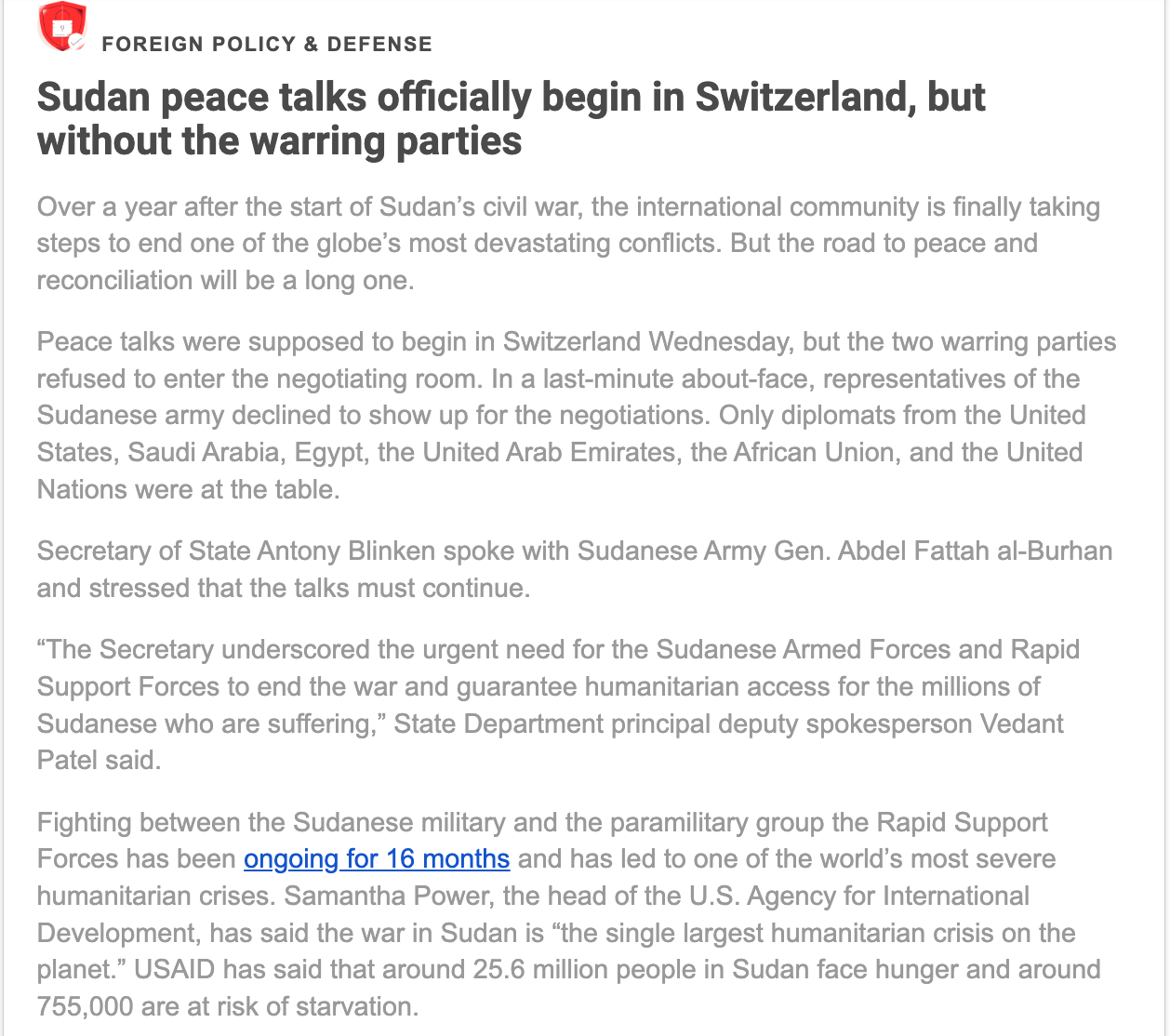I spent about five days last week on the road, driving between Maryland and Maine to attend my cousin’s barnyard wedding. I dipped my toes into the deliciously warm waters of a Maine lake in August and watched a lone paddle-boarder pass his oars through the calm waters while blasting Sublime from a boombox.
It was a wildly different image of the world than the one I’m used to, a land full of farm stands advertising “CUKES” instead of bombs and protests and politics and mayhem. There was a delightful chihuahua at the secluded woodland house where I stayed, and he completely upended my opinion of dogs.
It was one of those long weekends that makes you wonder, why can’t things always be this pleasant?
While I was away, talks began in Switzerland to end the war in Sudan that is threatening almost 1 million people with imminent starvation. Ukraine invaded Russia and took over roughly 74 villages. Some details about who blew up the underwater NordStream 2 pipeline were finally unveiled. Germany said the water at several of its military bases had been contaminated. Protests erupted in Serbia and Slovakia. Wildfires began scorching Greece. Police in Tanzania arrested hundreds of opposition supporters. Thailand got a new prime minister. Violence continued in Bangladesh. The governments in Venezuela and Vietnam cracked down on dissent. The Islamic State started to make a comeback in northern Syria, and the U.S. mobilized to stop them. Negotiations to end the war in Gaza continued, albeit unsuccessfully. Yemen is on the brink of civil war once again, and Iran began a government reshuffle amidst some controversy. You can read about all that and much more in the sections below.
Here’s a calm image to start your Sunday before you delve into the news.
Lazo Magazine is on social media. You can follow along on Facebook, Twitter, LinkedIn, and Instagram. And if you can donate to Lazo Magazine or become a paid subscriber to this newsletter, that’s always appreciated.
What I’m writing:
• I spoke to Congressman Bill Keating about how some members of Congress are pushing for more U.S. involvement in the Western Balkans. This interview is unlocked and free to read.
My weekly news blurbs:
What I’m reading:
• From New Lines Magazine, a deep look at the growing humanitarian crisis in Sudan.
• A key border crossing for humanitarian aid to enter Sudan will be reopened for three months, CNN reports.
• Russia declared a state of emergency in the Belgorod region as Ukraine’s surprise incursion enters its second week, the Wall Street Journal reports. President Volodymyr Zelensky said Ukraine now controls 74 towns and villages in the Kursk region. Meanwhile, U.S. officials say that Kyiv’s incursion forced Russia to withdraw some of its military forces from Ukraine.
• Ukraine captured the Russian town of Sudzha, around six miles from the Ukrainian border, the New York Times reports. It would be Ukraine’s first capture of a Russian urban center since its surprise incursion began 11 days ago.
• Ukraine set up a military administrative office to “maintain law and order” in Russia’s western Kursk region, the BBC reports.
• Belarusian President and key Putin ally Aleksandr Lukashenko called for peace between Russia and Ukraine, saying, “Let’s sit down at the negotiating table” to end the conflict. His plea is set to be broadcast on Russian state-owned channel Rossia 1 on Sunday. Politico Europe has the story.
• Germany issued an arrest warrant for a Ukrainian man suspected of involvement in blowing up the Nord Stream pipeline nearly two years ago, the New York Times reports.
• Ukrainian President Volodymyr Zelensky initially approved a plan to blow up the Nord Stream gas pipelines — before unsuccessfully trying to call it off at the CIA’s request, the Wall Street Journal reports. Valerii Zaluzhnyi, Ukraine’s former top general, “ignored the order” from Zelensky and “forged ahead” with the plan to destroy the pipelines ferrying Russian gas to Germany.
• Two military bases in Germany were put under heightened security after contaminants were found in the water supply of barracks at one site, the New York Times reports. The military said sabotage is suspected.
• Tens of thousands protested in Belgrade against lithium mining in Serbia, the Associated Press reports.
• Thousands gathered in Bratislava to protest the recent dismissals of Slovakia's heads of cultural institutions by the country's culture minister, Euronews reports.
• Protesters in Slovakia see the dismissals as an effort by Prime Minister Robert Fico’s government to steer the country away from the European Union mainstream in its cultural agenda, Bloomberg reports.
• The Council of Europe’s Commissioner for Human Rights, Michael O’Flaherty, called on Bulgarian President Rumen Radev not to sign a law banning LGBTQ+ “propaganda” in schools into law, Politico Europe reports. The far-right, pro-Russian Revival party introduced the amendment to the country’s education code. Radev has so far refused to overturn the new law.
• A large wildfire scorched 25,000 acres of land — twice the size of Manhattan — on the fringes of Athens, the capital of Greece, Space.com reports.
• British counterterrorist police charged seven people with violent disorder after a group of pro-Palestinian demonstrators broke into an Israeli arms company site in southwest England, the New York Times reports.
• The New Yorker has a piece on the warped world of the UK rioters.
• A Hamas official said the group would not take part in the next round of ceasefire talks because its leaders do not think Israel has been negotiating in good faith, the New York Times reports. Prime Minister Benjamin Netanyahu denied that he is trying to block a ceasefire deal by hardening Israel’s position but has added new conditions to Israel’s demands in private.
• Representatives from Israel, the United States, Qatar, and Egypt continued over a Gaza ceasefire and hostage release deal, the Washington Post reports. Hamas says it will reengage if it receives a “clear commitment” from Israel on its latest proposal.
• Iranian officials said that only a ceasefire deal in Gaza stemming from hoped-for talks would restrain Tehran from direct retaliation against Israel for the assassination of Hamas leader Ismail Haniyeh, Reuters reports.
• Israel published plans for one of its proposed new settlements in the occupied West Bank, Reuters reports. “No anti-Israel or anti-Zionist decision will stop the development of the settlement. We will continue to fight against the dangerous idea of a Palestinian state,” Finance Minister Bezalel Smotrich said.
• Yemen’s rival parties are making military preparations and threatening to resume war as hunger and cholera worsen in the country, the Associated Press reports.
• A second round of Turkish-mediated talks between Somalia and Ethiopia aimed at repairing soured ties ended without a deal, Reuters reports.
• Iran’s vice president resigned in a public display of deep divisions as the new government takes shape, the New York Times reports. It came after President Masoud Pezeshkian, who ran as a reformist, announced his cabinet would include several conservatives.
• Iranian President Masoud Pezeshkian proposed a former nuclear negotiator as the country’s new foreign minister, ABC News reports. Pezeshkian also sought to appoint a woman as housing minister. She would be Iran’s first female minister in over a decade if approved.
• The United States is waging a hidden campaign to contain a resurgence of the self-styled Islamic State group in northeastern Syria, as the group is seemingly rebounding amid conflict in the Middle East, the Wall Street Journal reports.
• U.S.-backed and Kurdish-led Syrian fighters said they conducted an attack in eastern Syria, striking three posts manned by pro-government gunmen and killing 18, the Associated Press reports.
• Turkish airstrikes in northern Iraq “neutralized” 17 members of the outlawed Kurdistan Workers Party, Reuters reports.
• International Criminal Court prosecutors said they are “actively monitoring” events in Venezuela, where security forces have launched a sweeping crackdown on dissenters, the Associated Press reports.
• In secret talks, the United States offered amnesty to Venezuelan President Nicolás Maduro in exchange for ceding power, as overwhelming evidence emerges that he lost last month’s election, the Wall Street Journal reports.
• Renewed fears of ethnic cleansing against the Rohingya are growing after reports that hundreds of people were killed by drone strikes while escaping violence in Myanmar’s western Rakhine state, CNN reports.
• Bangladeshi protests attacked supporters of ex-Prime Minister Sheikh Hasana, who was ousted by student protests, NBC News reports.
• Vietnam’s government is carrying out its most intense crackdown on critics and dissenters in decades, jailing activists, lawyers, and journalists and driving more into exile, the Washington Post reports.
• Thailand’s Prime Minister Srettha Thavisin was removed from office after a court ruled that he violated the country’s constitution by appointing a lawyer who had served prison time to his cabinet, CNN reports.
• Thailand’s parliament picked Paetongtarn Shinawatra, the daughter of tycoon and former leader Thaksin, as prime minister, the BBC reports. At 37, she will lead the Pheu Thai Party as the country’s youngest prime minister and the second woman in the post.
• Police in Tanzania arrested the leaders of the country’s main opposition party and hundreds of its supporters in a major crackdown, the Guardian reports.
You can write to me for any reason: c.maza@protonmail.com








